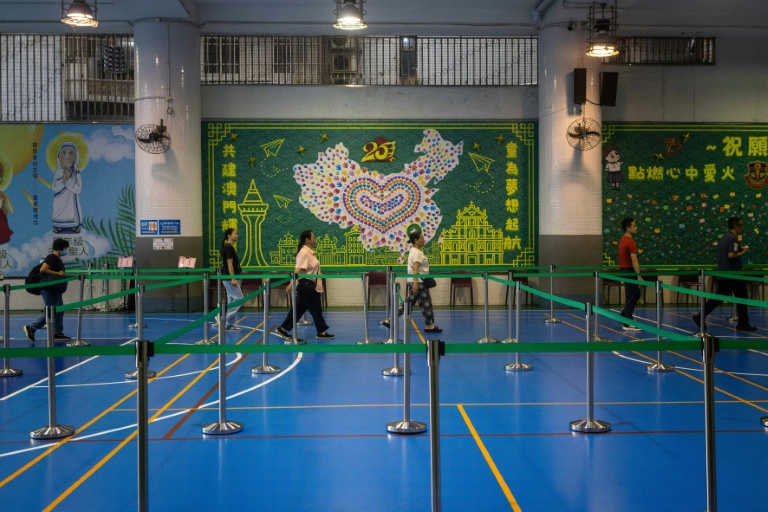World
Macau’s First ‘Patriots Only’ Election Records Low Voter Turnout

Macau’s first legislative elections restricted to “patriots only” experienced one of the lowest voter turnout rates in recent history. Preliminary results from the elections held on September 17, 2024, indicated that only 53 percent of the more than 328,000 registered voters participated. This turnout positions the election as the fifth lowest among the seven elections conducted since Macau’s return to Chinese sovereignty in 1999.
The city, which has a population of nearly 700,000, saw over 175,200 residents cast their votes to select 14 members of the 33-seat legislature. The remaining positions will be filled through sector-based indirect elections and official appointments. While officials noted that this was the highest number of votes cast in a legislative election since 1999, the turnout rate raised concerns regarding public engagement in the political process.
The recent electoral changes stem from amendments to the election laws made in 2024, which granted national security officials the authority to determine candidates’ eligibility. In the lead-up to the election, authorities disqualified twelve candidates, citing their failure to uphold the city’s mini-constitution and pledge allegiance to Macau. Additionally, former opposition lawmaker Au Kam-san was arrested in July for alleged foreign collusion, marking the first application of Macau’s national security law in such a context.
Voter Sentiments and Election Dynamics
Political scientist Eric Sautede commented on the low turnout, describing it as a “perfect illustration of the expression ‘voting with one’s feet’.” Many voters expressed disillusionment with the current political landscape. A voter, identified only as Un, noted that the queues at polling stations were shorter than in previous elections, suggesting a lack of enthusiasm. Another voter, a 38-year-old clerk, who chose to remain anonymous, stated that even if he had registered, he would not participate, feeling that “there’s no real politics in Macau anymore.”
The election featured only six candidate lists for direct election, the fewest since the handover to China. Chief Executive Sam Hou-fai undertook initiatives to increase voter turnout, including providing free public transportation on election day. Despite these efforts, the number of blank and invalid ballots was alarming, with 5,987 blank votes and 7,077 invalid votes recorded. When asked about this record number, election officials declined to comment.
Implications for Future Governance
The legislative changes and disqualifications have led to concerns about the future of political discourse in Macau. Eilo Yu, a former professor of government at the University of Macau, suggested that the high number of invalid votes might be viewed as “acceptable” to Beijing. He indicated that the disqualifications represent an effort to suppress dissenting voices within the legislature and predicted that lawmakers could become mere rubber-stampers for government policies.
Yu emphasized that while voters still retain some choice, the trend appears to be toward diminishing that electoral space. The evolving political climate in Macau raises significant questions about the future of governance and citizen engagement in the region.
As Macau navigates this new political landscape, the implications of these elections will likely resonate beyond its borders, reflecting broader themes of governance and civic participation in the context of increasing central oversight from Beijing.
-

 Science3 months ago
Science3 months agoToyoake City Proposes Daily Two-Hour Smartphone Use Limit
-

 Top Stories3 months ago
Top Stories3 months agoPedestrian Fatally Injured in Esquimalt Collision on August 14
-

 Health3 months ago
Health3 months agoB.C. Review Reveals Urgent Need for Rare-Disease Drug Reforms
-

 Technology3 months ago
Technology3 months agoDark Adventure Game “Bye Sweet Carole” Set for October Release
-

 World3 months ago
World3 months agoJimmy Lai’s Defense Challenges Charges Under National Security Law
-

 Lifestyle3 months ago
Lifestyle3 months agoVictoria’s Pop-Up Shop Shines Light on B.C.’s Wolf Cull
-

 Technology3 months ago
Technology3 months agoKonami Revives Iconic Metal Gear Solid Delta Ahead of Release
-

 Technology3 months ago
Technology3 months agoApple Expands Self-Service Repair Program to Canada
-

 Technology3 months ago
Technology3 months agoSnapmaker U1 Color 3D Printer Redefines Speed and Sustainability
-

 Technology3 months ago
Technology3 months agoAION Folding Knife: Redefining EDC Design with Premium Materials
-

 Technology3 months ago
Technology3 months agoSolve Today’s Wordle Challenge: Hints and Answer for August 19
-

 Business3 months ago
Business3 months agoGordon Murray Automotive Unveils S1 LM and Le Mans GTR at Monterey









